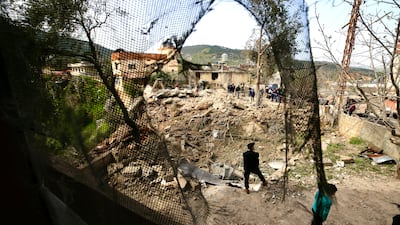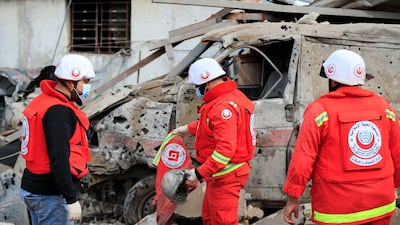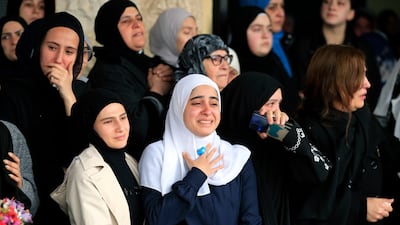Live updates: Follow the latest news on Israel-Gaza
Rights groups are investigating Israel’s repeated killing of medical staff in Lebanon as a potential war crime, after 10 paramedics were killed by several Israeli air strikes on Wednesday.
The 10 paramedics were among 16 civilians killed in three separate air raids that day, marking the highest civilian death toll for one day since the cross-border conflict between Hezbollah and Israel erupted nearly six months ago.
Seven of the 10 paramedics were killed in Habariyeh when the Israeli army struck a centre belonging to the Lebanese Ambulance Association. Israel said the strike targeted “a significant terrorist operative” of the Hezbollah-allied Islamic Group, along with “additional terrorists who were with him".
But the Lebanese Ambulance Association said no fighters were present during the strike.
“The seven people who died were young men. University students. They were paramedic volunteers,” said Mohyadine Qarhani, director of the emergency and relief service of the Lebanese Ambulance Association.
The powerful blast destroyed the medical centre and an ambulance, “hindering our ability, as paramedics, to provide emergency services”, Mr Qarhani said. “How can we help people if they keep targeting us?”
“It was a shock that they would target medical workers like this. We still don’t know why they hit us,” he told The National. He denied his centre had any affiliation with the Islamic Group, a Lebanese political party that operates its own armed militia, known as the Fajr Forces.
Later on Wednesday evening, following an Israeli attack on a house in Tair Harfa that killed four Hezbollah fighters, medics were combing the rubble for bodies or survivors when they were also struck.
Two paramedics were killed, both for belonging to Hezbollah’s Islamic Health Society. A third medic, affiliated with the Hezbollah-allied Amal movement, was killed in a cafe in the border town of Naqoura when he stopped for coffee on the way to join the rescue effort in Tayr Harfa.
“The cafe was a common meeting and co-ordination point for people in the area,” a representative of the Risala Scouts told The National on Thursday. He said the medic who was killed, Hussein Ahmad Juheir, was getting coffee with two other members of the Amal movement when the strike hit the cafe.
In fractured, quasi-feudal Lebanon, it is not uncommon for local civil defence groups to be affiliated with various political parties.
But, according to Sahar Mandour of Amnesty International, which is investigating whether Israeli attacks on emergency workers in south Lebanon constitute a war crime, medics are civilians regardless of their affiliation.
“International human rights law protects all civilians from attacks, but the most solid protection is provided to two kinds of institutions – medical institutions and educational institutions,” she said.
She said Amnesty International is investigating four separate Israeli attacks against emergency vehicles and medical facilities in the south, three of them belonging to the Islamic Health Society and one to the Lebanese Ambulance Association.
“We are investigating whether there is a breach of international humanitarian law because these ambulances are protected, and provide vital emergency healthcare throughout the south. However, the [Israeli army] claims these facilities are used for military purposes,” she said.

Ms Mandour acknowledged the difficulty of such investigations. South Lebanon is a war zone: most civilians have fled, save for militants, emergency workers, and the brave, stubborn few who refuse to leave their homes.
But, for the vast majority of civilians, including journalists and human rights researchers, the dangerous conditions of the conflict make it impossible to maintain a presence in south Lebanon, and even more difficult to establish the facts.
“The conditions of our work are becoming harder,” Ms Mandour admitted. “When journalists were hit in October 2023, 10 cameras were running before, during, and after the strikes. We had a lot of evidence, bits of shrapnel, and abundant testimonies.”
“Now the access is different,” she said. “People are reluctant to speak” owing to Israeli phone surveillance.
“Our access on the ground is more controlled, so our ability to work with evidence and testimony is more difficult, and it’s slow.”
According to the Hezbollah researcher Amal Saad, the killing of the paramedics could be construed as an attempt to provoke Hezbollah, giving Israel a pretext for war.
“It’s deliberate,” she said. “Because Hezbollah will feel a greater responsibility to respond [to the strikes on paramedics].”












